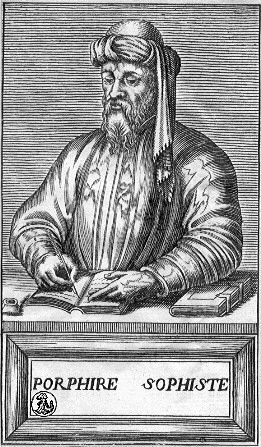
Porphyry (philosopher)
Porphyry of Tyre (/ˈpɔːrfɪri/; Greek: Πορφύριος, Porphýrios; c. 234 – c. AD 305) was a Neoplatonic philosopher born in Tyre, Roman Phoenicia[1] during Roman rule.[a][1][2] He edited and published The Enneads, the only collection of the work of Plotinus, his teacher.
Porphyry of Tyre
c. AD 234
305 (aged 70–71)
- Introduction to Categories (Εἰσαγωγή; Introductio in Praedicamenta or Isagoge et in Aristotelis Categorias commentarium), The Life of Pythagoras (Πυθαγόρου βίος; Vita Pythagorae), On Abstinence from Animal Food (Περὶ ἀποχῆς ἐμψύχων; De Abstinentia ab Esu Animalium), On the Cave of the Nymphs in the Odyssey (Περὶ τοῦ ἐν Ὀδυσσείᾳ τῶν Νυμφῶν Ἄντρου; De Antro Nympharum), Introduction to Ptolemy's Tetrabiblos (Εἰσαγωγὴ εἰς τὴν Ἀποτελεσματικὴν τοῦ Πτολεμαίου), Commentary on Ptolemy's Harmonics (Εἰς τὰ ἁρμονικὰ Πτολεμαίου ὑπόμνημα), On the Life of Plotinus and the Arrangement of his Work (Περὶ τοῦ Πλωτίνου βίου καὶ τῆς τάξεως τῶν βιβλίων αὐτοῦ; Vita Plotini), Starting-points leading to the intelligibles (Ἀφορμαὶ πρὸς τὰ νοητά; Sententiae ad intelligibilia ducentes), Philosophy from Oracles (Περὶ τῆς ἐκ λογίων φιλοσοφίας; De Philosophia ex Oraculis Haurienda), Against the Christians (Κατὰ Χριστιανῶν; Adversus Christianos)
He wrote original works in the Greek language on a wide variety of topics, ranging from music theory to Homer to vegetarianism.[b] His Isagoge or Introduction, an introduction to logic and philosophy,[c] was the standard textbook on logic throughout the Middle Ages in its Latin and Arabic translations.[3] Porphyry was, and still is, also well-known for his anti-Christian polemics.[4] Through works such as Philosophy from Oracles and Against the Christians (which was banned by Constantine the Great),[5] he was involved in a controversy with early Christians.[6]
Life[edit]
The Suda (a 10th-century Byzantine encyclopedia based on many sources now lost) reports that Porphyry was born in Tyre.[7] His parents named him Malkos or Malchus (cf. Old Aramaic malkā 'king'), though he changed it into the name "Basileus" (cf. Ancient Greek βασιλεύς basileús 'king'), and into his nickname "Porphyrius" (cf. Ancient Greek πορφύριος porphýrios 'clad in purple') later in his life.[4] In his work The Life of Plotinus, he refers to Aramaic as his "native tongue."[8] Under Cassius Longinus, in Athens, he studied grammar and rhetoric, and became acquainted with Middle Platonism.[4]
In 262 he went to Rome, attracted by the reputation of Plotinus, and for six years devoted himself to the practice of Neoplatonism, during which time he severely modified his diet, at one point becoming suicidal.[9] On the advice of Plotinus he went to live in Sicily for five years to recover his mental health. On returning to Rome, he lectured on philosophy and completed an edition of the writings of Plotinus (who had died in the meantime) together with a biography of his teacher. Iamblichus is mentioned in ancient Neoplatonic writings as his disciple, but this is most likely only meant to indicate that he was the dominant figure in the next generation of philosophers succeeding him.[10] The two men differed publicly on the issue of theurgy.
In his later years, he married Marcella, a widow with seven children and a student of philosophy.[11] There are around sixty works connected to Porphyry's name, some in fragments or lost. Some pieces of his work are still being reconstructed today.[12] Little more is known of his life, and the date of his death is uncertain.